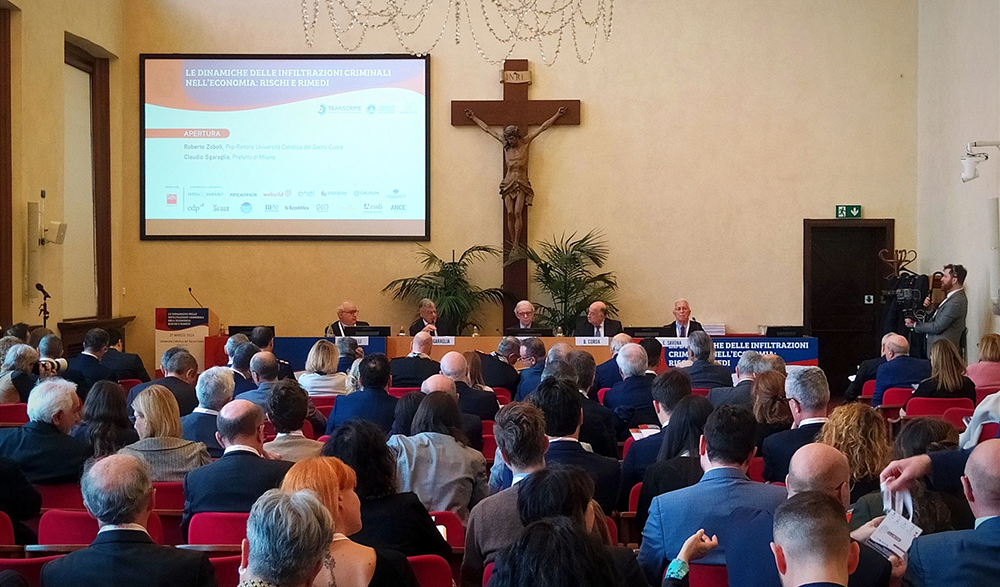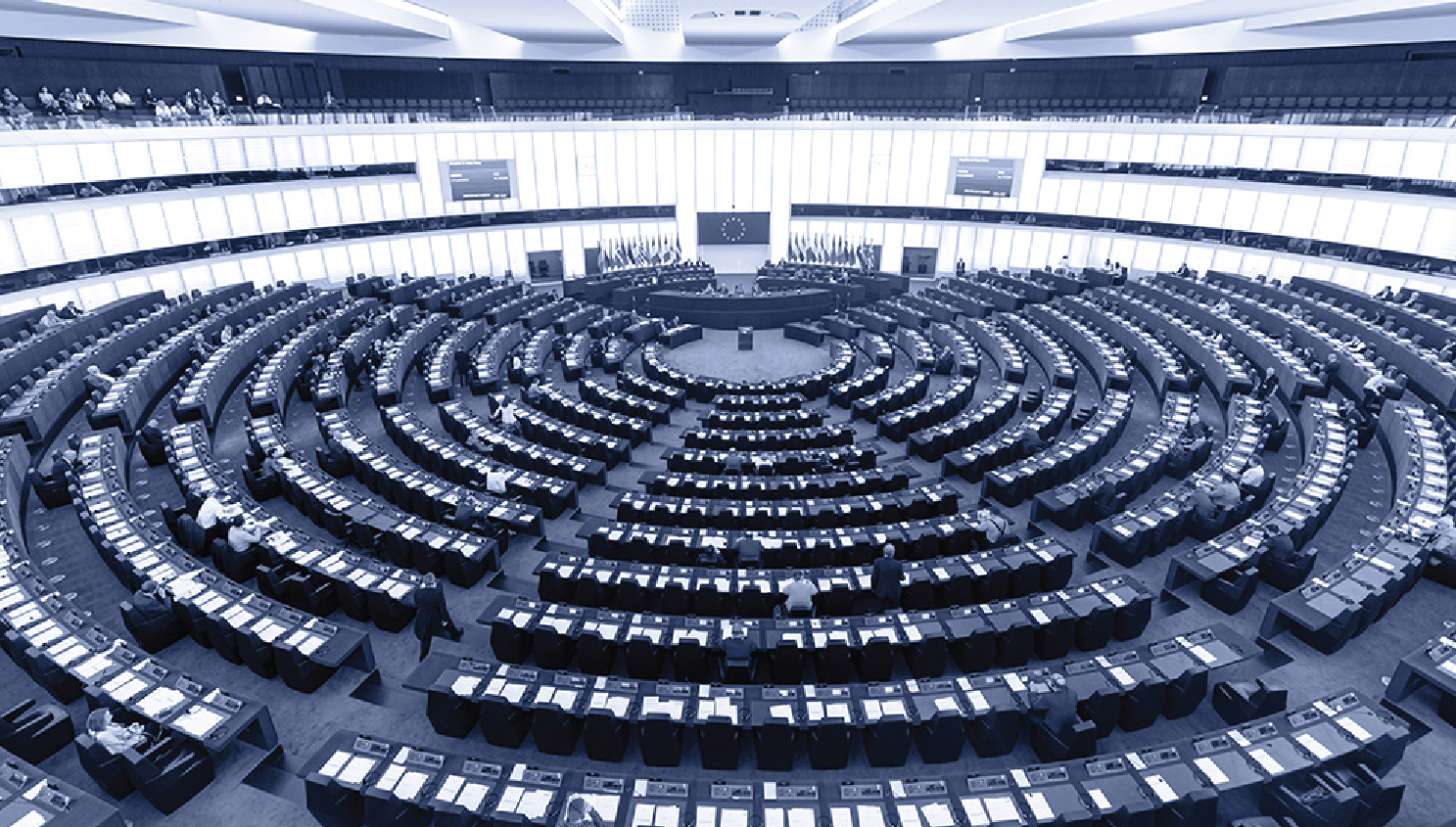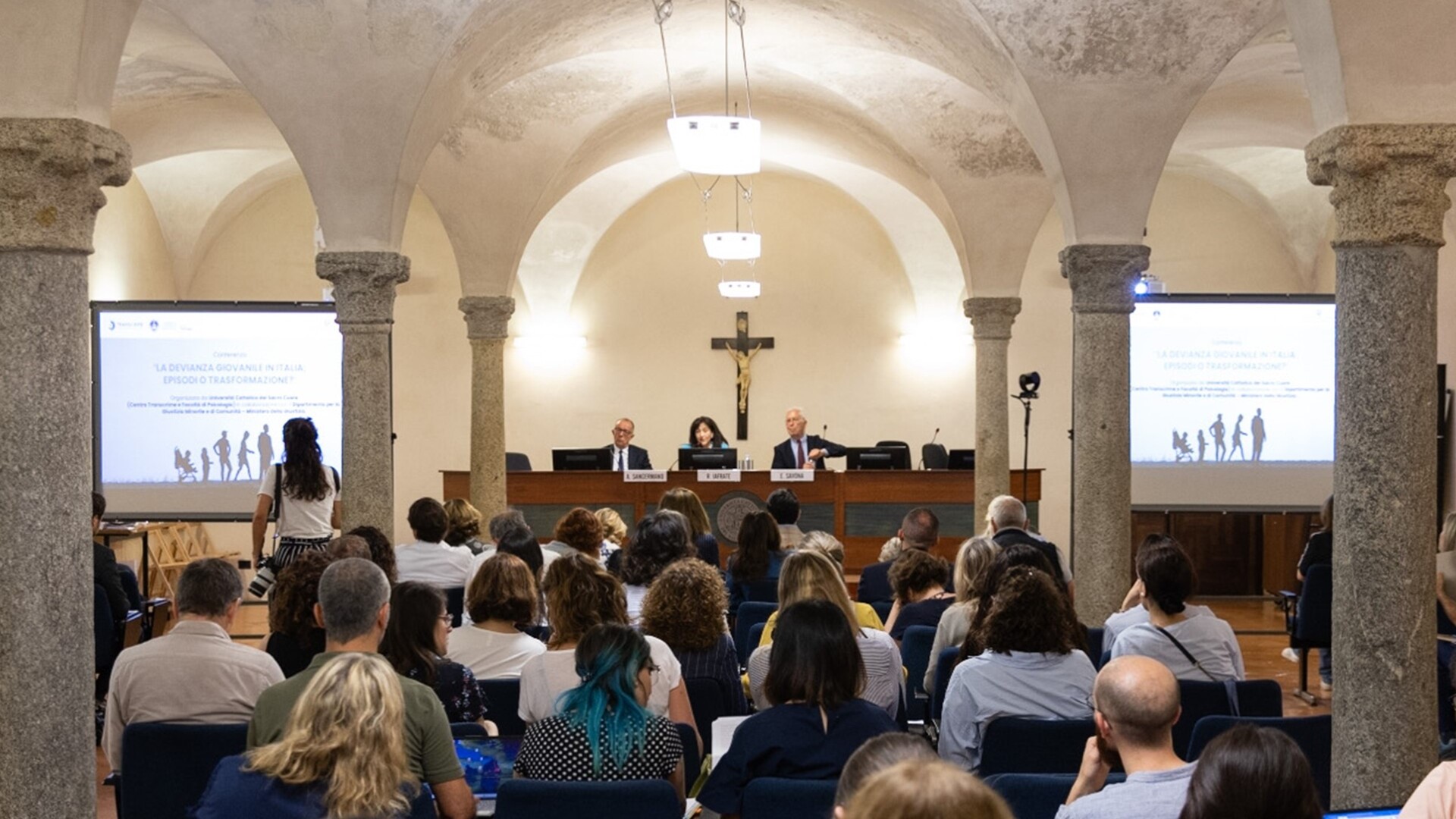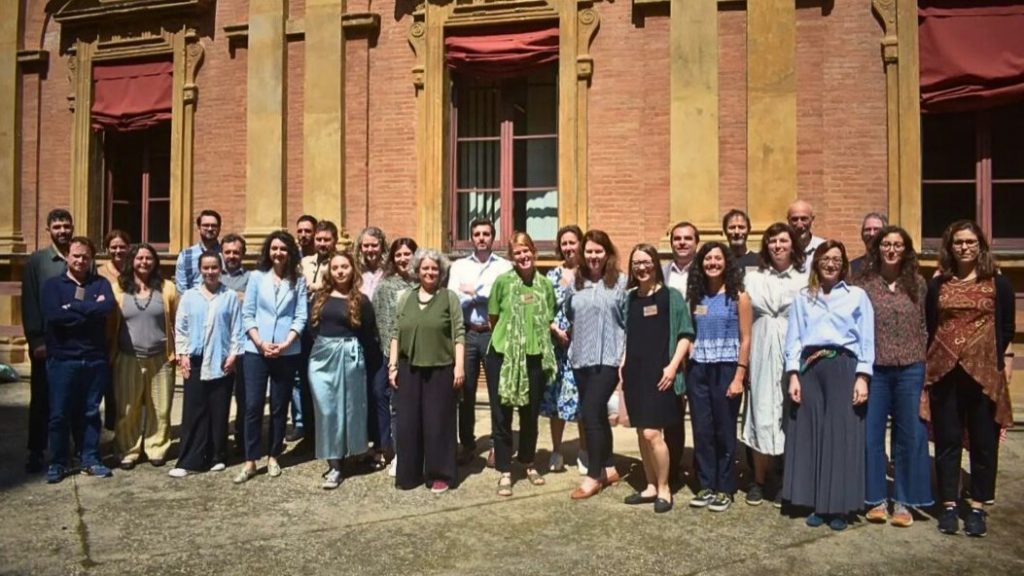Infiltration into the legal economy: the advanced stage of organised crime in Italy
A one-day conference on ‘The Dynamics of Criminal Infiltration in the Economy: Risks and Remedies‘ was held at the Università Cattolica del Sacro Cuore in Milan. The initiative, organised by Transcrime-Università Cattolica del Sacro Cuore and ANFACI (Associazione Nazionale Funzionari Amministrazione Civile dell’Interno), brought together researchers, prefects, magistrates, business and banking representatives, historians and journalists to discuss the challenges and measures to be taken against criminal infiltration strategies in legal markets, an advanced form of organised crime in Italy.
“Despite the significant results achieved and the capabilities acquired, there are still infiltrations that need to be fought and better known,” said Prefect Ignazio Portelli, State Commissioner for the Sicilian Region and President of ANFACI, who opened the conference. “The fight against infiltration is an obstacle course and, for many reasons, does not always produce the right and expected results. However, it is always an ethical and moral duty to work to deepen the furrow of legality”.
“The issue of criminal proceeds and their use in the legitimate economy is not sufficiently recognised in its relevance,” explains Prof. Ernesto Ugo Savona, Director of Transcrime. “The aim of this conference is to broaden the understanding of these issues, to promote awareness of the national system, to strengthen cooperation between the actors involved and to raise awareness among companies in terms of risk assessment and threat reporting. Moreover, 30 years after the creation of Transcrime, research support is proving to be crucial in defining risk factors and translating them into technologies and intelligence initiatives to support the prevention capacity of public authorities and companies”.


The fight against mafias in Italy still focuses on identifying and convicting the perpetrators of crimes, while economic investigations into mafia assets take a back seat. However, prosecution alone has shown little deterrent or rehabilitative effect. In order to improve the ability to disrupt criminal organisations, panellists including Giovanni Melillo, National Anti-Mafia and Anti-Terrorism Prosecutor, discussed the role of support for the prosecution of prefectural interdiction orders – functional to deprive mafias of the resources that guarantee their continuity; academic research – in the development of risk indicators and innovative tools to analyse large amounts of data; and the cooperation of banks and businesses.
The effectiveness of interdictions has made it possible to curb the intensive exploitation of companies for criminal purposes, while at the same time ensuring the continuity of their production. However, this effectiveness is undermined by the low number of seizures and confiscations of illicit assets abroad: according to data collected by the European RECOVER project, in which Transcrime is a partner, only a few dozen of the thousands of assets seized in Italy are confiscated abroad. This is a further incentive for the internationalisation of the mafia.
Criminal organisations adapt to this scenario by adopting increasingly complex corporate structures. There is a need to develop technologies and risk indicators capable of detecting anomalies in corporate activities and structures. A study carried out by Transcrime for PoliS-Lombardia, with the support of the Prefecture of Milan, has demonstrated the effectiveness of this tool by applying 30 risk indicators to over one million companies in Lombardy, relating to ownership structure, management, territorial context, economic-financial activity, political exposure and negative events or journalistic leaks. During the validation phase – explains Prof. Francesco Calderoni of the Università Cattolica and Transcrime researcher – the indicators demonstrated the ability to correctly identify a sample of interdicted companies with a probability up to 25 times higher than a false identification, using advanced machine learning techniques. Another study by Transcrime, also employing risk indicators, analysed Italian companies with changes of ownership during the Covid-19 emergency and found that the number of opaque corporate structures was more than ten times higher than the average for other Italian companies and the number of links to risky jurisdictions was five times higher.
The entrepreneurial development of the mafia has a distorting effect on competition, the cost of which is paid by the community. The entrepreneur, initially a victim of coercion, as Milan’s public prosecutor Alessandra Dolci points out, ends up forming an alliance with the mafia organisation, which is able to guarantee services at extremely favourable prices. In this new context, the fight requires the use of new IT platforms containing information of interest currently stored in databases that do not communicate with each other.
In this sense – explains Prof. Michele Riccardi, Deputy Director of Transcrime – in several European projects, such as DATACROS, KLEPTOTRACE o INVERT, Transcrime is developing advanced tools together with the authorities to improve their ability to identify high-risk individuals or companies in a timely manner, to reconstruct complex networks of relationships and to trace international criminal patterns. These tools are also adapted and used by banks and companies to improve their ability to prevent money laundering activities among customers and criminal infiltration in the supply chain.
The use of these advanced predictive models and the partnership between the public, private and research worlds – says Enrico Pirastru, Head of Security at Fincantieri – makes it possible to identify a cascade effect involving the entire supply chain and the network of partners attributable to each company, protecting the private sector from the mimetic, adaptive and highly competitive capacity of organised crime. Not only economic and reputational risks, but also business interruption risks – adds Andrea Pizzoli, Director of Risk & Compliance at Fiera Milano – make it necessary to control the network of suppliers in order to monitor every phase, from the engagement to the physical control of access and the execution of services, especially in sectors that are more exposed to risks, for example due to the high incidence of labour.
The recent history of the fight against the mafia – says the journalist Marcelle Padovani – cannot be dissociated from the analysis of its manifestations, not only in Italy, but also internationally; especially in Europe and America, where the repressive bodies study and take as a model the Italian laws and techniques for combating mafia associations. The complex nature of these organisations – explains Leoluca Orlando, former mayor of Palermo – involves actors and activities in the legislative, judicial, political, social, cultural, religious, economic and information sectors, as recent chronicles have shown. A chronicle that, especially in Sicily, provides a framework for future decisions and actions.
These issues were also discussed with other representatives from the world of academia and research, prefects (including Darco Pellos, Prefect of Venice, Bruno Corda, Prefect and Director of ANBSC, and Laura Lega, Prefect and Secretary General of ANFACI), magistrates (including Vincenzo Salamone, President of the Regional Administrative Court of Campania, Fabio Roia, President of the Court of Milan, and Maurizio de Lucia, District Prosecutor of Palermo), business and banking representatives (including Massimo Ferrari, General Manager of Webuild, and Arianna Rovetto, Anti-Money Laundering Manager of Banco BPM), writers (Isaia Sales), journalists (including Luigi Ferrarella and Conchita Sannino) and other experts. Full list available in the programme (here).

Latest news
View all news
Transcrime’s Alignment with Europe’s Security Priorities
On 18 July, ahead of her re-election as President of the European Commission, Ursula von der Leyen presented her programme for the next five years to the European Parliament plenary. Amid increasing external and internal criminal threats to democratic values, the rule of law, and the free market, her speech…

Illicit medicines online: CAPSULE report published
Six out of Ten Illegal Online Ads for Medicines Are Not Recognised by Consumers Only half (53%) of online advertisements for medicines are correctly categorized by consumers as legitimate or illicit. This result emerged from project CAPSULE, conducted by Transcrime–Università Cattolica del Sacro Cuore in cooperation with the…

Juvenile delinquency in Italy: violence on the rise, but not the number of offences
The violent nature of the crimes committed by young people is on the rise and the age at which they commit their first crime is falling, but the number of cases is not increasing. This is the result of a study we carried out on the basis of data from…

RESPOND Kick-Off Meeting
On 22-24 May, the kick-off meeting of the RESPOND project took place at the Alma Mater Studiorum of the University of Bologna together with the consortium partners. RESPOND – Rescuing Democracy from Political Corruption in Digital Societies – is a five-year project funded by the European Commission’s Horizon Europe programme…

Conference: “Juvenile Deviance in Italy: Episodes or Transformation?”
Date: 17 June 2024 Time: 9.30am – 1.30pm Location: Catholic University of the Sacred Heart (Milan), Largo Gemelli 1 Room: Cripta Aula Magna In Italian Public perceptions of juvenile delinquency are often influenced by a distorted and alarmist narrative. But what do the official…

Second KLEPTOTRACE Training for Public and Private Organisations
“How to trace complex forms of ownership and control of assets related to corruption and other financial crimes” 8 April, 2024 | 12:30 – 17:30 CET Hybrid attendance: online (webex) or on-site (Università Cattolica del Sacro Cuore, Largo Gemelli 1, Milan) The second training session will cover best practices, database and…

